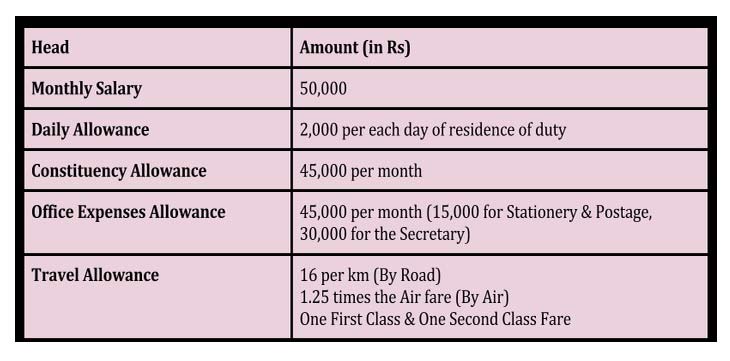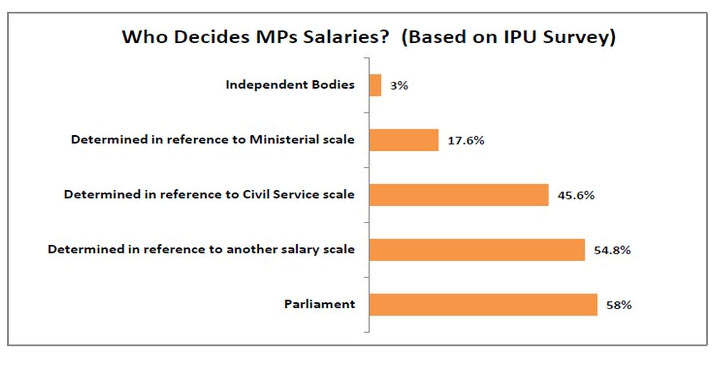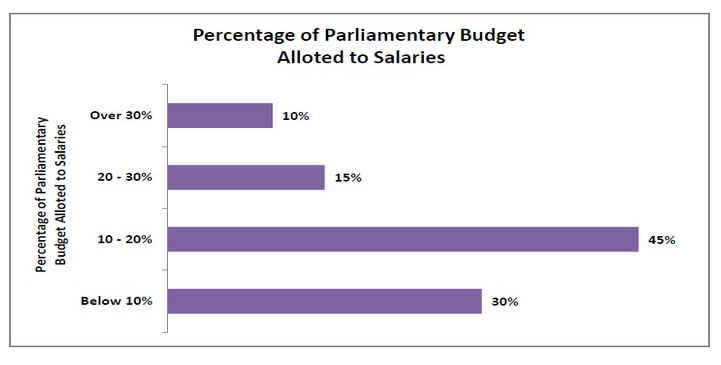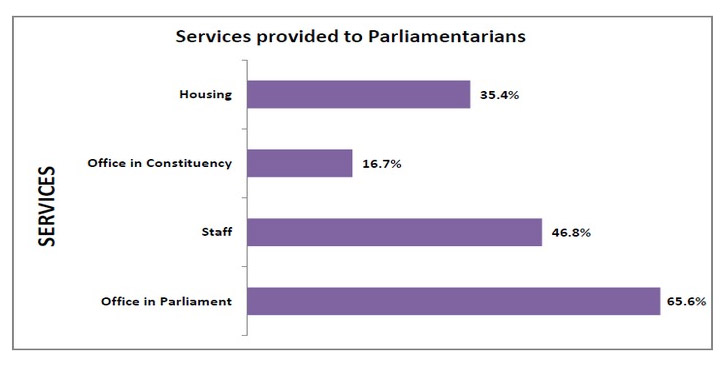
MPs' Salaries was again in the news, thanks to the proposal of setting up an independent Commission to recommend MPs' salaries.
The Ministry of Parliamentary Affairs has proposed a 3-member independent Emoluments Commission to recommend salaries and other allowances for the Members of Parliament (MPs).
This proposal is contained in the Agenda Notes prepared by the Ministry for the two day All India Whips' Conference.
In a two part series, we will look at whether MPs in our country are getting enough salary & support and how does it compare to the rest of the world.
What is the Current Setup?
Presently, as per Article 106 of the Constitution of India, salaries of MPs are determined by the Act of 1954, amended from time to time. In other words, the Parliament (MPs themselves) decides the salaries of MPs.
The last revision in salary of MPs was made in 2010 and MPs presently get a basic salary of Rs.50,000 per month. Salaries of Members of State Legislatures are decided as per Article 195 of the Constitution.
Apart from the monthly basic salary, they are given a Constituency Allowance of Rs 45,000 per month and Office Expenses of Rs 45,000 per month.
All of this put together, they get around 1,40,000 of fixed pay per month.

There also other allowances & benefits extended to MPs like the following travel allowance, free accommodation in Delhi, free water, free electricity, free air travel etc.
What is being proposed?
The Ministry of Parliamentary Affairs, in the Agenda Notes for the Whips Conference stated that "The setting up of an independent Emoluments Commission for recommending the salaries and allowances of the Members of Parliament will not only put to rest the public outcry and media criticism over MPs themselves deciding their salaries, it will also provide an appropriate opportunity to take into consideration the huge responsibilities and the important role they play in our representative democracy.
It would ensure that recommendations on Parliamentary salary are reached in a fair, transparent and equitable way. Once there is consensus on setting up of the Commission, the Salary, Allowances and Pension of Members of Parliament Act,1954 will suitably amended".
The general principles suggested by the Ministry for determination of salary should be:
- Salary should not be so low as to defer suitable candidates or so high as to make pay the primary attraction for the job;
- Salary should reflect level of responsibility; and
- Those with outside interests should not be deterred from entering Parliament, those who chose to make Parliament a full-time career should be adequately rewarded to reflect their responsibilities.
How is it elsewhere?
The Inter Parliamentary Union (IPU) an international organization of Parliaments, has done a survey in 2013 on parliamentary salaries and allowances.
The survey report is based on responses from 104 parliaments (96 countries) and 138 parliamentary chambers. A country can have more than one parliamentary chamber like the Lok Sabha & the Rajya Sabha. According to this research,
- About 58% Parliaments reported that they have the power to determine their salaries like in India.
- About 54.8% Parliaments reported that their salaries are determined in reference to an external scale (for example, the Civil Service scale)
- About 61.5% Parliaments reported that they have the power to determine allowances
- 45.6% reported that the salaries are determined in reference to the Civil Service salary scale
- 17.6% reported that the salaries are linked to the Ministerial salary.
Three parliaments responded that there are independent bodies which set parliamentary salaries; the Pay Commission for the Bhutanese National Council; the Public Office Bearers Commission for both chambers of the Namibian Parliament and the Independent Parliamentary Standards Authority (IPSA) for the UK House of Commons.
Disclosure of Salaries
According to the IPU survey, 41.1% parliaments publish the amount of parliamentary salaries, and 44.4% publish information about allowances. 24.2% also publish the amount of allowances received by each member on their websites. The Lok Sabha also publishes this data on its website.
The IPU report also made an interesting observation, that in 23.2% parliaments, parliamentary salaries or allowances have been reduced since 2008. The report notes that this may be a consequence of the global economic crisis.
Parliamentary Budgets allotted to Salaries & Allowances
The survey notes that the percentages of parliament's budget allotted to parliamentary salaries and allowances were not available for certain chambers which do not have separate budget lines for salaries and allowances.
Only 101 chambers provided the percentage for the salaries and 102 did for the allowances.
Among the 101 chambers, an average of 15.9 per cent of the budget was allotted to parliamentary salaries. 45 chambers (45 percent) allotted between 10 and 20 per cent. The percentages varied between 0.51 and 66.55; with 12 parliaments allotted below 5 per cent.
Services provided to Parliamentarians
Apart from salaries & allowances, certain other services are provided to parliamentarians in various countries.
Close to 2/3rd of the Parliaments provide an office space in parliament, 47% provide Staff, only 1/6th provide office space in the constituency, and 36% provide housing.

(Rakesh has been working on issues related to Right to Information (RTI) for a decade. He is a Data/Information enthusiast & passionate about Governance/Policy issues).

















